Jordan Peele remains the elusive showman of modern American cinema, and with Nope he pulls off his boldest hat trick yet—a genre spectacle that is as enthralling as it is unnerving, as self-consciously mythic as it is eerily ambiguous. At a time when every new alien movie tries to out-gloom its predecessors, Peele has the audacity to make the unknown not just frightening, but beautiful and indecently entertaining.
The film opens, like so many classic American myths, on a dusty California stretch of land—part ghost town, part movie-lot purgatory. Daniel Kaluuya and Keke Palmer play OJ and Emerald Haywood, siblings whose family trains horses for Hollywood. It’s not two minutes before the “sky falls”—coins and keys raining down with lethal randomness—killing their father and setting the tone: we’re watching cosmic mischief, not another X-Files retread.
Peele puts his love of the movies front and center, not in fussy homage but in the bones of the thing. The siblings, descendants (maybe, maybe not) of the first motion picture stuntman—the black rider from Muybridge’s old zoopraxiscopes—are showbiz footnotes haunted by history, fighting to get a shot of their own (literally: a shot of “the Oprah” variety). The movie lives and breathes on this meta-cinematic hunger for image, spectacle, and proof. What is a flying saucer, after all, but the ultimate Hollywood camera—hovering, consuming, devouring the gaze?
Kaluuya, ever the anchor (has any actor built a career so quietly on stillness?), gives OJ a weary gravity. If his role here is less electric than Get Out, it’s because Peele aims for the dark, unspoken wells of grief and grit. The real revelation is Keke Palmer, entering each scene as an adrenaline jolt; she’s kinetic and smart-aleck, a canny update on the final girl who refuses to be anyone’s sidekick. Steven Yeun is handed a potential powder keg of a part—child-star-turned-showman with a closet full of trauma—and while the script tantalizes with subtexts (fame, exploitation, monkey business, literally and figuratively), he’s left stranded just when things get weirdest.
Style is everything here. Hoyte van Hoytema’s cinematography is so luxuriously strange that you half expect the sky itself to sprout eyes. There’s a midnight beauty to the burnt-orange desert, the lonely KN95 masks, the fat clouds looming like judgmental angels. The creature—no spoilers, unless the internet already ruined it for you—unfurls from Spielbergian cliché into something sensual, aquatic, almost Renoir-ethereal. Peele’s monster isn’t just a threat; it’s performance, seduction, and appetite all at once.
Some of Peele’s favorite themes—America’s appetite for spectacle, trauma as recurring sideshow, the viewers’ complicity—are back, sharper and more chilling than before. Yet the film never drowns in its own cleverness. There’s a chimpanzee, for reasons both literal and surreal, that gives the film a primal pulse. It’s both a punchline and an undercurrent of dread, a reminder that the true beast never really leaves the stage.
If the storytelling sometimes takes odd turns—characters who vanish, ideas that go half-explored—it’s a price Peele is willing to pay for cinematic daredevilry. Every set piece (the blood rain, the TMZ biker) pulses with that giddy, unpredictable terror that Peele alone seems able to engineer. It doesn’t always resolve; sometimes it just explodes in spectacle, and that’s the point.
Peele makes horror for grownups—sly, seductive, never stupid. There’s a wild intelligence here, a love of moviemaking’s primal pleasures and nightmares, that makes most studio sci-fi look like sanitized plastic. Nope is less the compressed terror of Get Out and more a loose, ambiguous funhouse: less polemic, more fever dream.
In the end, Nope is a new kind of creature feature—one that gazes back at the audience, dares them to look, then swallows them whole. A modern myth that’s not afraid to be a little messy, a little silly, and a lot glorious. In an era of safe bets, Peele is the last showman willing to risk the crowd’s unease for that one devastating shot.
A thoroughly good time, shot through with real American weirdness. The only thing scarier than the monster in the sky might be our willingness to watch, and watch, and watch again.


